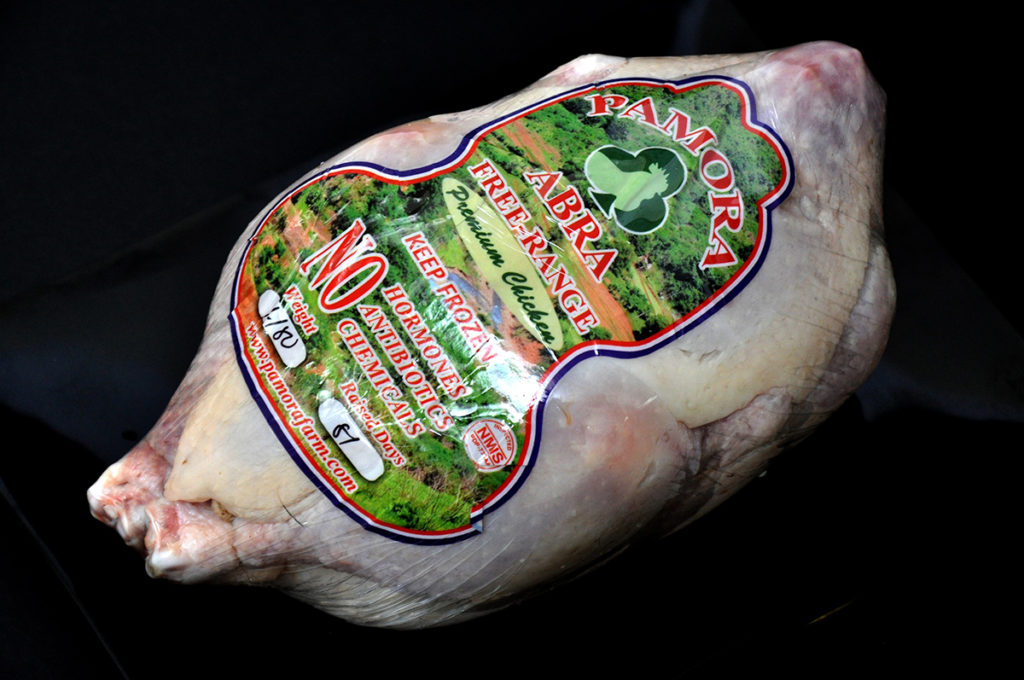“Pamora Farm started to raise free-range chicken in 2000, in just 1,000 square meters of land,” says general manager Tina Morados.
“Initially, the objective was for our families to have our own source of organically grown chicken. Then other relatives and friends got wind of what we were doing and started ordering. This customer base grew to friends of friends, including foreign residents in Manila who had tasted the free-range chicken.”
Eighteen years later, the Abra-based business has grown exponentially to supply some of Manila’s top hotels, thanks to its high standards in growing chickens as well as its free-range philosophy.
Philippine national standards for organic poultry requires only a minimum of 70 days for chickens to grow, but Pamora follows the French Label Rouge standards and grows their premium chicken (1 to 1.850 kg) for a minimum of 81 days, sometimes up to 100 without injecting hormones and chemicals to rush the growing process.
“We allow the body of the chicken to develop naturally so when you eat free-range chicken, you’ll notice that the bones are stronger and do not easily break,” explains Morados.
The birds are grown with feed intake designed for free-range chickens. To boost their immune system, they use herbal concoctions made from oregano, ginger, chili, lemongrass, and kakawate found in their farm in Barangay Garreta, Pidigan, Abra. “These prevent them from getting sick, thus eliminating the need for synthetic veterinary medicines,” she says.
“We grow the chickens the way a chicken normally should, scratching the ground to find food to access natural vitamins, minerals, and other nutrients available in the grass, insects, and the soil. They are left roaming in the open—they run, they fight, they exercise,” describes Tina Morados.
Pamora Farm chickens are brooded from day one to 21, depending on the weather or season, sometimes a week longer or a week shorter. Afterwards, the chickens are set free and allowed to follow their natural instincts. “We grow the chickens the way a chicken normally should, scratching the ground to find food to access natural vitamins, minerals, and other nutrients available in the grass, insects, and the soil. They are left roaming in the open—they run, they fight, they exercise,” describes Morados, adding that this results in chicken meat that is firm and containing only eight to 10 percent fat content versus 19 to 29 percent in commercial chicken.
As a pioneer in the free-range poultry industry, Pamora Farm has invested in production process standardization that complies with both local and international standards. The farm is the only National Meat Inspection Services-accredited “AA” poultry dressing plant in the Cordilleras and the only dressing plant in the Philippines that caters exclusively to free-range chickens, using an air-dry chilling process that is compliant with EU standards on poultry dressing facilities.
“We chose air-dry chilling because we don’t want to use the water chilling process where the chickens are soaked in iced water with chlorine for two to three hours. Air-dry chilling maintains the freshness, meat quality, and taste of the chicken, and no water is absorbed by the chicken. Meaning, what we get is 100 percent chicken meat,” emphasizes Morados.

The dressing plant is also complete with blast freezing equipment and cold storage. Pamora Farm’s whole dressed chickens are vacuum-packed while choice cuts are individually quick-frozen. “This way, you do not need to thaw the whole pack if you just need one or two pieces of the chicken parts.”
“Chicken farming is not just a business for us, it’s our passion. We eat what we produce. So we make sure that our chickens are produced for quality before quantity. No hormones, no antibiotics, no chemicals,” says Morados who was awarded Knight in Order with Merits in Agriculture (Chevalier du l’Ordre du Mérite Agricole) by the French Ministry of Agriculture and Fisheries (Le Ministre de L’Agriculture et de La Peche) in 2008. This prestigious award was established in 1883, second only to the Legion of Honour within the French order of precedence. It is given to those with outstanding contributions to agriculture.